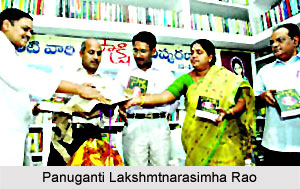 Panuganti Lakshmtnarasimha Rao is remembered for Telugu theatre and also the periodical essay named Sakshi Vyasamulu. His thirty-odd plays reveal a mastery of craftsmanship and believable characters with strong motivations, for which he was hailed as "Andhra Shakespeare". The first three plays namely Narmada-Purukutsiyamu i.e. `About Narmada and Purukutsa` in 1900, dramatized from a Bhagavata story. Sarangadhara in 1902 was a popular legend in Andhra and Prachanda Chanakyamu i.e. Valorous Chanakya in 1903 comprise apprenticeship attempts.
Panuganti Lakshmtnarasimha Rao is remembered for Telugu theatre and also the periodical essay named Sakshi Vyasamulu. His thirty-odd plays reveal a mastery of craftsmanship and believable characters with strong motivations, for which he was hailed as "Andhra Shakespeare". The first three plays namely Narmada-Purukutsiyamu i.e. `About Narmada and Purukutsa` in 1900, dramatized from a Bhagavata story. Sarangadhara in 1902 was a popular legend in Andhra and Prachanda Chanakyamu i.e. Valorous Chanakya in 1903 comprise apprenticeship attempts.
Career of Panuganti Lakshmtnarasimha Rao
With his fourth play, Radha-Krishna in 1909, Panuganti Lakshmtnarasimha Rao became matured as a Telugu dramatist. It delicately presents Radha`s divine love for Lord Krishna. The intense erotic sringara rasa is shown in its manifestation of bhakti and karuna or pathos. This was an unusual subject for drama. Bhakti also predominates in Vaijayanti vilasamu or `Vaijayanti`s Exploits` in 1909. This was popularly known as Vipranarayana charitra or `Vipranarayana`s Story`. Panuganti was a devotee of Lord Rama, which led to his dramatization of Rama`s legend in four plays. The names can be mentioned as Kalyana Raghavamu or "Raghava`s Nuptials" in 1915, Pattabhanga Raghavamu i.e. "Raghava`s Averted Coronation" in 1909, Vanavasa Raghavamu or `Raghava in the Forests` in 1908, and Vijaya Raghavamu or `Raghava`s Victory` in 1906.
The eminent Telugu theatre personality, Panuganti Lakshmtnarasimha Rao also wrote several historical plays with Shakespeare`s histories as models. The mentionable names are Buddha bodha sudha i.e. `The Buddha`s Teachings` in 1910, Viramati in 1923, and Chudamani i.e. `Crest Jewel` in 1929. These are noteworthy for their excellent characterization. The last two deal with valorous heroines, a favourite subject of Panuganti`s. The nobility of women forms the theme of Padmini, Purnima, and Mudrika. Intricate plot construction is a quality of all these plays.
Panuganti`s comedies fall into two groups. Kokila in 1909 and Saraswati in 1920 bear distant resemblances to Shakespeare`s Twelfth Night and A Comedy of Errors. The other kind is the comedy of manners. Vichitra vivahamu or `Strange Marriage` in 1910 deals with the rush of child marriages before the promulgation of a Bill prohibiting them. His best comedy, Kanthabharanam or `Necklace` in 1917 presents a wayward young man`s sensual escapades. It contains some memorable characters in Somavadhani, Subbisetti, and the Nawab. Panuganti also handled the dramatic poem with rare felicity and control. Panuganti Lakshmtnarasimha Rao died in 1940.




















